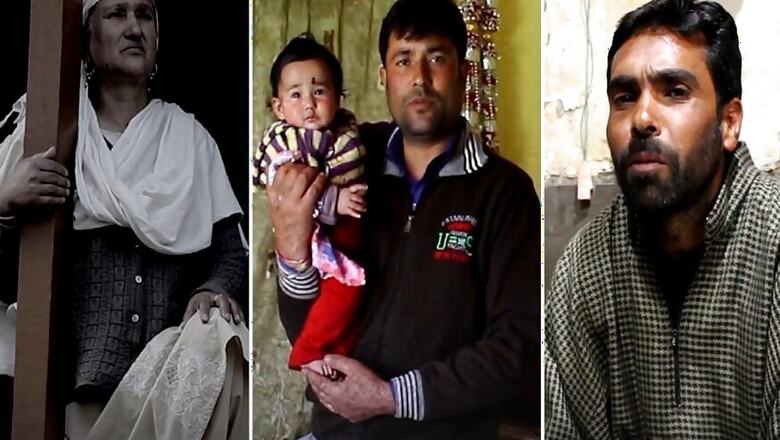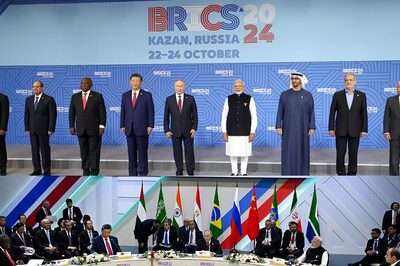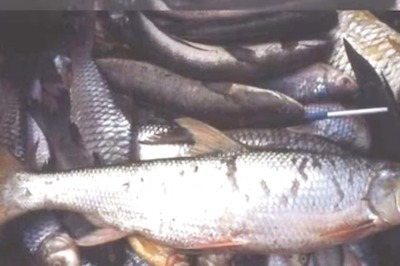
views
Jammu: It’s a usual morning in North Kashmir’s Baramulla town. The streets are still deserted. The day hasn’t yet started for the public.
In its main market, right next to the river Jhelum, the crowd hasn’t started to swell. Newspaper vendors and a few milkmen on their bicycles patrol its streets. A couple of CRPF men have tucked themselves inside a bunker – their eyes scanning every possible movement outside. They are guarding the Raghunath Mandir – a revered Hindu temple in the center of the town.
As the sun’s rays filter through the morning mist, a small figure hurriedly enters the CRPF bunker and makes his way inside the temple. An elongated red vermillion on his forehead makes him stand out. He is one of the Pandits of Kashmir who never migrated from the Valley.
There were more than 1,50,000 Kashmiri Pandits who resided in the Valley before 1990. Now, the number stands at a lowly 2,764. The Hindu minority in Muslim majority Kashmir shrank overnight following the days of threats and living in fear.
The roots of the exile date back to 90s when Kashmiri Pandits were killed by militants, following the growing unrest in the Valley. This promoted a wave of fear among them which ultimately resulted in them migrating to the plains of Jammu region of the state.
Thousands of Pandit families picked whatever little they could, leaving behind their homes, shops and their family members - and crossed the Banihal tunnel to reach Jammu.
However, some stayed back. They stayed despite their relatives and neighbours leaving their homes; they stayed and decided to face whatever was in store.
Ravinder, a Kashmiri Pandit from Kralhaar, Baramulla said that the 90s came like a ‘wind’ that changed everything. When most Pandits were migrating, Ravinder’s family decided to follow as well. But for Ravinder, it was his friends’ support that made them change their mind. “My friends showed extraordinary support, they suggested us not to migrate, they guaranteed our safety, convinced my father and sisters, and with Gods will we stayed and stayed for good," he said.
Ravinder still remembers his school days. “My friends were mostly Muslims, we used to wander around without any fear, regardless of our religions." Ravinder remembers those times as the best part of his life.
The Curse of The Conflict
When the series of brutality started, it looked like someone had cursed Kashmir.
A militant organisation published an advertisement in AlSafa, an Urdu newspaper, openly threatening the Hindu community and asking them to migrate. This is the exact point when peace was torn in pieces.
It was the time of test for the brotherhood that the Valley had long boasted about.
"When a daily newspaper published Pandits should migrate within 72 hours my husband and brother went to meet the sarpanch and chowkidaar and asked for their suggestion, they assured us that no harm will be done to us and that gave us the courage to stay," said Sheela, a Pandit woman of Sheeri Baramulla in her sixties.
"There was no guarantee of life. Once you would leave in the morning, there was no surety of your return," she said. “Doors were closed at 4 pm and opened at 7:30 in the morning," she added, remembering the days of living in fear.
But these Kashmiri Pandits also have fond memories.
Rakesh Bhat from Krankshivan Sopore said when his father died the whole village gathered.
“They performed everything so well that we never felt that there was no Pandit here," he said.
At that moment of loss, Rakesh was helped by strangers. “They contradicted my assumption that there will be no one to shoulder the corpse of my father," he said.
The Neighbours
Sheela remembers the Eid of 1986 when the news of her brother’s death spread in the village. “Every house emptied their Eid dishes, ended their celebrations and joined us in our sorrow," she said.
However, there’s often a void on such occasions — it takes their relatives and friends days to reach after hearing the news. And, not having people from their own community makes it worse.
"Though neighbours here perform their parts well, but not having our community is difficult," said Ravinder Kumar. Too often, they have to arrange priests from Jammu to perform religious rites.
Celebrating festivals has not been the same after the majority of Pandits migrated to the other side. The charm of the village on Shivratri was lost, and only a few houses are lit up on the eve Diwali.
For Girja Devi, it’s the questions from her grandchildren that’s most difficult. Devi, who lives in Baramulla, has taught her grandchildren about the pooja rituals that she does daily in her home. But, on days of festivals, her grandchildren often asks the whereabouts of their relatives.
“I remain speechless," she said.
Even after years, the pain of being separated from friends and relatives is hard.
“During festivals and wedding, we really miss our relatives and friends. Whenever we see any of them, it's like a dream," said Sheela. “The time when we lived together is like a dream that shattered."
And, what about the conflict and protest? Venu Kumar, a resident of Sheeri, said that he was never asked to join any sort of protest, or pelt stones. “There has been tremendous support from whole village, I never felt like I am from any other community, we never felt any danger or threat,'' he said.
No plans or special packages
It was in 2016 when the Jammu and Kashmir high court directed the state government to consider the plea of Valley based Kashmiri Pandits to extend the Prime Minister's package for creation of three thousand government jobs.
However, the sacrifice of these families is yet to get any notice from the government of either state or Centre. The sympathies and promises were mere words, but no practical implementation has so far come into existence.
Sanjay Tickoo, the president of Kashmiri Pandit Sangharsh Samiti (KPSS), an organisation that looks after the affairs of the Pandits who remain in Kashmir, said that they conducted a survey in 2008 and found 808 families which consist of 2864 Pandits who have never migrated from Kashmir. But, Tickoo is disappointed with the government.
“There have been no special efforts for uplifting and employing our youth who stayed behind. We were expecting something from PM’s special package as Manmohan Singh had promised us, but, we were left behind," he said.
The KPSS President said that when their demand was about to be met, some people from the Sikh community filed a petition for their due share in the package.
The special ordinance, issued in October this in 2017 by the government to carry out a special recruitment drive for the unemployed Pandit youth of the Valley was challenged by unemployed Sikh youth from Kashmir by filing a petition before the High Court. They argued that the Sikh community also deserves the benefits of the amendment.
“So, it’s still pending," Tickoo said.
Rakesh Kumar, another Kashmiri Pandit from KrankShivan, Sopore, said that while the government is leaving no stone unturned to bring back those who migrated, nothing is done for those who stayed.
“We were the ones who showed courage to live here when it was a threatening time,'' he said.
(Author is a freelance journalist based in Kashmir)




















Comments
0 comment